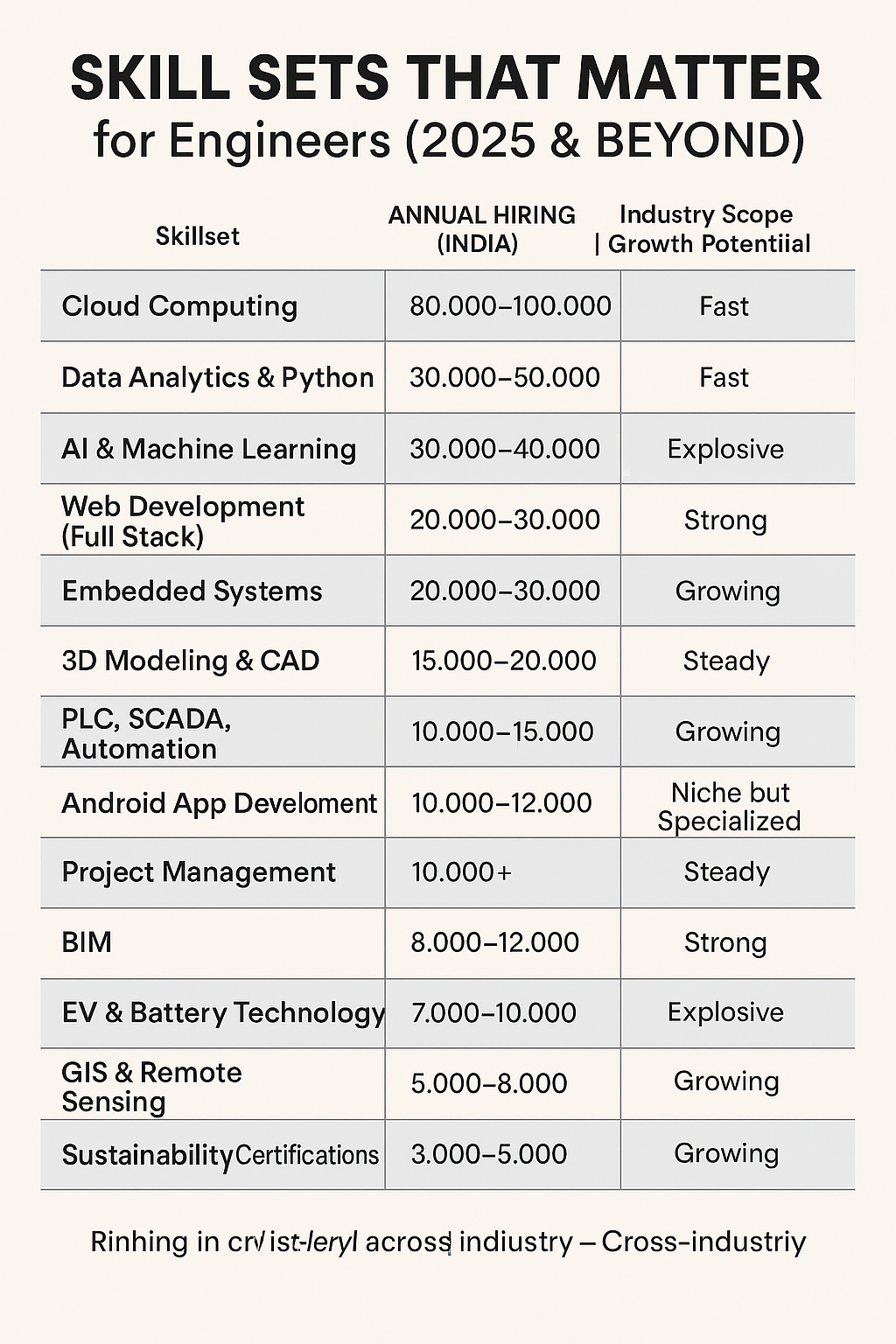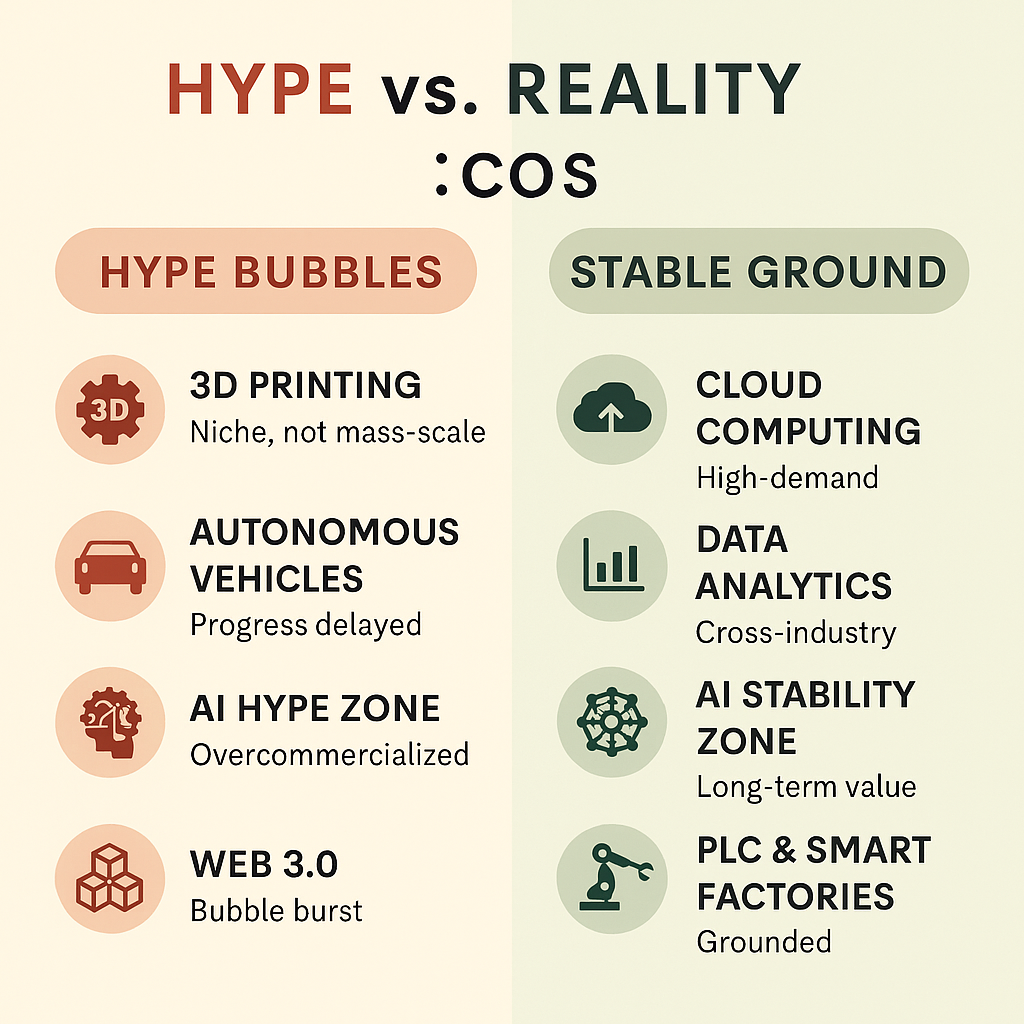User Ideas / Prospects
In today’s fast-evolving job market, engineering graduates in India are bombarded with promises of futuristic careers in sectors that appear to be booming.
But beneath the flashy projections and viral trends, many of these so-called "rising sectors" may actually be hype bubbles—they grow rapidly on public perception, not on stable industrial foundations.
This report is not just a forecast. It’s a protective insight for students and job seekers, based on real data, peer debates, and market research.
The Hype Bubbles: Danger Zones for Engineers
1. 3D Printing: Overstated for Mass Manufacturing
The Hype: Supposed to revolutionize construction and mass production.
The Reality: Valuable in prototyping and R&D, but not scalable for everyday, high-volume manufacturing.
2. Autonomous Vehicles: Progress Delayed
The Hype: Full self-driving cars by 2025.
The Reality: Regulatory, safety, and infrastructure barriers make mass deployment years away. India’s public roads are not near-ready.
3. AI Hype Zone: Non-Foundational, Over-Commercialized AI
The Hype: Generative AI will rapidly replace most content creators, coders, and engineers.
The Reality:
Most "prompt engineering" jobs are quickly disappearing or evolving.
AI tools for surface-level content and simple coding tasks are already saturated.
Many companies face hallucination, privacy, and ethical challenges, leading to slower adoption than headlines suggest.
Caution: Careers built only around using AI tools without understanding the algorithms, ethics, or product integration are highly unstable.
4. Web 3.0: The Known Bubble
The Hype: Blockchain will dominate the next internet wave.
The Reality: Crypto winter, regulatory pushback, and limited enterprise adoption proved the bubble burst.
The Stable Ground: Careers with Real Demand 1. Cloud Computing
Annual Hiring: ~80,000–100,000 in India.
Why It’s Stable: Cloud is the backbone of digital transformation across every industry.
2. Data Analytics with Domain Expertise
Annual Hiring: ~70,000–100,000.
Why It’s Stable: Business decisions increasingly rely on real-time data.
3. AI Stability Zone: Core, Industrial, and Applied AI
Annual Hiring: ~40,000–50,000.
Why It’s Stable:
AI for medical diagnostics, supply chain optimization, manufacturing quality control, and predictive maintenance has long-term real-world demand.
Growth is grounded in solving specific industry problems, not just creating flashy content.
Solid AI Careers:
Computer vision engineers
AI-driven control system developers
NLP in linguistics and healthcare
Robotics AI specialists
4. PLC & Smart Factories (Industry 4.0)
Annual Hiring: ~10,000–15,000.
Why It’s Stable: Automation is reshaping Indian factories and logistics.
5. Embedded Systems for EV and IoT
Annual Hiring: ~20,000–30,000.
Why It’s Stable: Real engineering demand in smart products and EV hardware is growing.
6. Sustainability Engineering
Annual Hiring: Growing steadily.
Why It’s Stable: Supported by global climate policies and India’s sustainability push.
Core Lesson for Engineering Students
Don’t follow the noise. Follow real-world problems.
Careers Skills Domain Reality Check
| 3D Printing | Niche, not mass-scale |
| Autonomous Vehicles | Delayed, limited hiring |
| Non-Foundational GenAI | Overcrowded, unstable |
| Web 3.0 | Bubble burst |
| Cloud Computing | High-demand, solid growth |
| Data Analytics | Stable, cross-industry |
| Core AI (Industrial, Applied) | Real jobs, long-term value |
| PLC & Smart Factories | Grounded, growing |
| Embedded/IoT Systems | Industry-supported growth |
| Sustainability Engineering | Policy-backed expansion |
The Core Lesson: "Hyped" Careers Share These Traits:
Characteristics Bubble Indicators
| Massive media coverage | ✅ Bubble risk |
| Few profitable use-cases | ✅ Bubble risk |
| Regulatory hurdles | ✅ Bubble risk |
| Low barrier to entry | ✅ Rapid saturation |
| Heavy reliance on funding | ✅ Prone to collapse |
Why This Matters
Chasing hype-driven jobs can cost engineering students valuable years and expensive reskilling cycles. The Indian engineering job market is brutally competitive. You need to be careful where you place your bets.
The responsibility lies with engineering educators, industry mentors, and journalists like us to separate short-lived bubbles from sustainable career paths.
Final Thought
Before aligning your career with a trend, always ask:
Is it solving an immediate, real-world industrial problem?
Are companies hiring at scale or just experimenting?
Does the field have consistent investment or just viral attention?
When the answer is "no," it’s probably a bubble waiting to burst.
Let’s commit to building careers with solid foundations—not air castles sold by hype.


